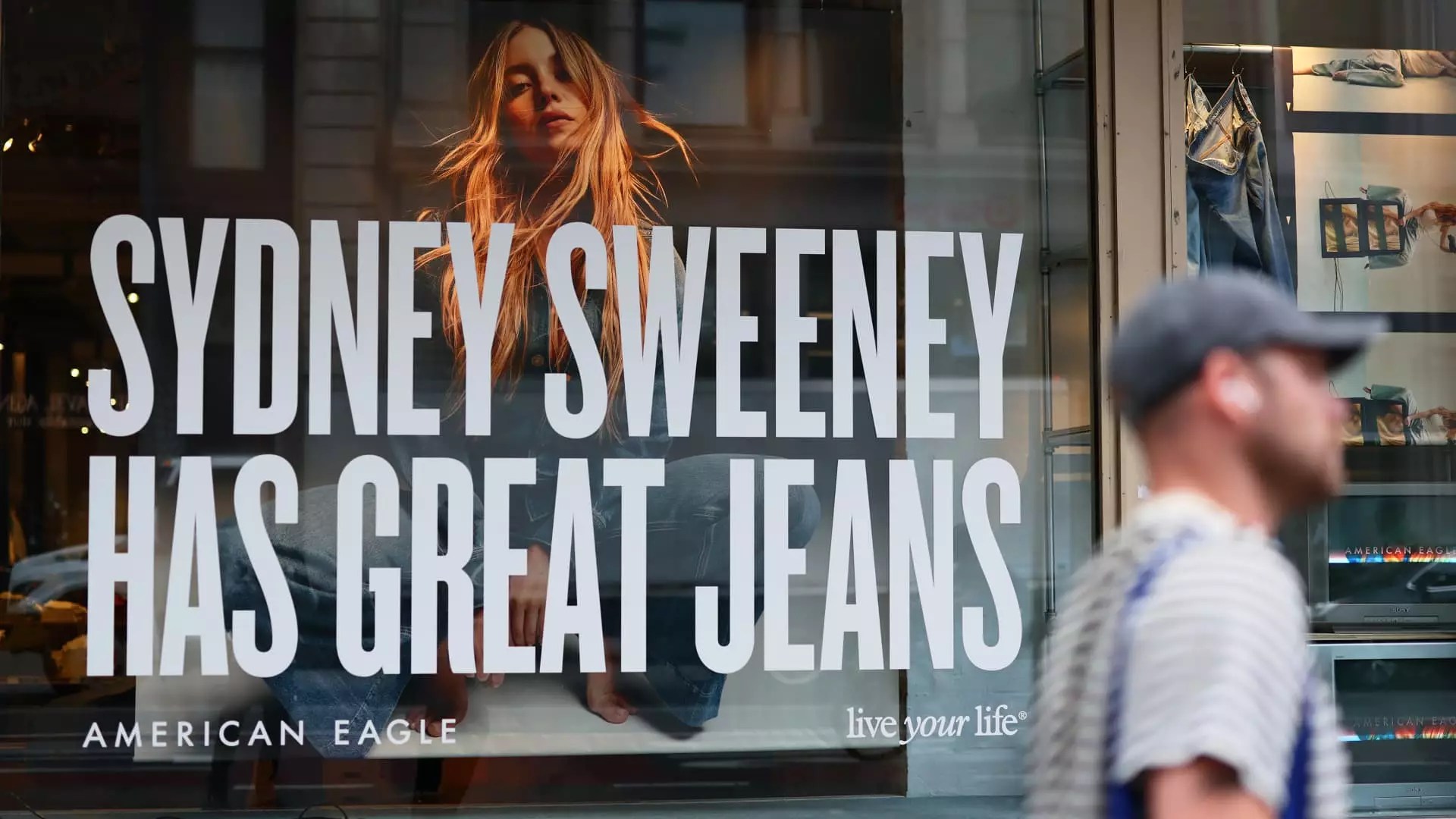In the contemporary landscape of retail branding, the integration of celebrity endorsement and political validation has emerged as a potent, yet perilous, strategy. American Eagle’s recent ascent—propelled rapidly by a tweet from Donald Trump—is emblematic of the unpredictable influence that political figures wield over consumer behavior. The stock’s 20% surge after Trump’s social media endorsement exemplifies how political commentary, especially from polarizing figures, can rejuvenate or undo brand confidence. But beneath this surface-level victory lies a complex web of implications about authenticity, market signals, and cultural alignment.
While some might see Trump’s praise as mere leverage for American Eagle to glean attention from a conservative-leaning demographic, it also raises questions about whether brands should seek validation in such contentious arenas. Are they risking their reputation by hitching their fortunes to political figures whose popularity has become increasingly unstable? The short-term spike in stock price suggests so, yet it forces us to ask if this kind of stunt is sustainable or ultimately superficial. Genuine brands should aim for authenticity, not fleeting political applause, because consumer loyalty—especially among younger demographics—tends to favor sincerity over spectacle.
The Marketing Choices that Divided Public Opinion
The controversy surrounding American Eagle’s campaign—the slogan “Sydney Sweeney has great jeans”—highlights the delicate line between provocative marketing and misjudged sensationalism. Critics argued that the ad was a double entendre aiming to hide an underlying critique about physical features, effectively reducing the actress to her appearance rather than her talent or personality. This kind of messaging, whether intentional or not, rubs many consumers the wrong way, especially in an era where authenticity and respect are increasingly demanded.
American Eagle’s silent response and brief reassurance—that their campaign was solely about jeans—only underscore the company’s awareness of this tension. The brand’s reluctance to openly defend or explain the slogan hints at a larger issue: the difficulty of navigating modern cultural norms without alienating significant segments of the audience. Younger consumers, in particular, tend to be more sensitive to perceived objectification or superficial messaging, viewing overt sexuality or stereotypes as outdated and tone-deaf. This disconnect can threaten the very loyalty the brand aims to rekindle.
The Risks and Rewards of Cultural Conservative Marketing
American Eagle’s approach offers a nuanced lesson in how appealing to a conservative or center-right demographic can be a double-edged sword. On one hand, appealing to traditional values—emphasizing confidence, straightforwardness, and classic beauty—can cut through the clutter of woke culture, making the brand stand apart in a crowded marketplace. On the other hand, rejecting overt social activism or progressive messaging runs the risk of alienating younger, socially conscious consumers who prioritize diversity and inclusivity.
The controversy around the campaign also underscores the importance of cultural alignment in marketing. In an environment where consumers scrutinize brands for their political stances and messaging, companies must ask themselves: is this a calculated stance or a reckless gamble? American Eagle’s move to lean into a more “uncontroversial” brand identity seems to have paid some dividends, as search interest in the retailer hits a two-decade high. Still, this spike could be superficial, disconnected from actual sales, especially given the retailer’s broader struggles with declining revenue, macroeconomic headwinds, and inventory issues.
The Financial Reality Behind the Political and Cultural Spin
Despite the glitzy headlines and social media uproar, American Eagle remains under significant financial strain. Having experienced a 27% decline in stock price this year, the retailer’s struggles are rooted in macroeconomic challenges—tariffs, sluggish consumer spending, and internal errors like over-discounting and inventory mismanagement. The campaign with Sydney Sweeney, while generating buzz and search interest, may not translate into the revenue boost needed to stabilize the company’s fragile footing.
The contradictions are stark: on one side, the company seeks to energize its brand with bold marketing and a political endorsement; on the other, it is battling declining sales, earnings downgrades, and a wavering consumer base. The recent campaign appears to be a calculated risk, an attempt to inject freshness into a stale sales trajectory. But in an era of heightened cultural sensitivity, the danger lies in whether such campaigns are perceived as authentic or simply opportunistic pandering.
The Underlying Lesson: Authenticity Over Shock Value
What American Eagle’s recent rollercoaster reminds us is that marketing in today’s climate is more about authentic resonance than shock or spectacle. Consumers are increasingly savvy—they can tell when a brand is pandering or manipulating cultural tensions for short-term gains. The success of a marketing campaign now hinges less on celebrity endorsements or provocative slogans and more on genuine engagement with the values and identities of the target audience.
From a pragmatic standpoint rooted in center-right liberalism, brands should acknowledge the complexity of societal change. Embracing traditional values—confidence, simplicity, and fairness—while respecting evolving social norms, can offer a sustainable route to growth. Instead of relying on controversial slogans or political endorsements, American Eagle should focus on authentic storytelling that celebrates diversity, individual confidence, and quality. The real challenge is to craft messaging that resonates emotionally without crossing boundaries that could turn loyal customers away.
American Eagle’s marketing missteps and political entanglements serve as a cautionary tale: in the saturated world of modern retail, superficial stunts and partisan endorsements may provide fleeting attention but threaten long-term credibility. Authenticity and careful cultural alignment remain the most valuable currencies in building a resilient, loyal customer base in an era where consumer trust is fragile and highly scrutinized.


Leave a Reply